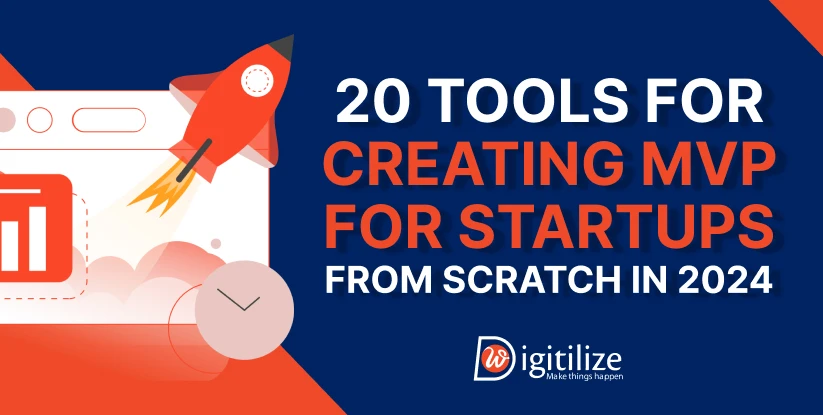20 Tools for Creating MVP for Startups from Scratch in 2024

Introduction to MVP Development in the Modern Startup Ecosystem
In 2025, tech startups move fast. Ideas change quickly. So, building a full product before testing the market doesn’t make sense anymore. That’s where MVP development comes in.
An MVP, or Minimum Viable Product, lets you test your idea with the least amount of time and money. It helps you learn what works, without wasting resources. MVP development isn’t just about coding. It’s about solving real problems and checking if your idea has potential.
In this guide, we’ll show you the best tools for MVP development in 2025. These tools help you turn smart ideas into working products, fast and efficiently.
Planning and Ideation Tools
1. Figma: Design Prototyping Reimagined
Figma has changed how startups design together. It runs in the cloud, so your team can work from anywhere. You can build user interface prototypes quickly and with less effort.
Designers and product managers can work on the same file at the same time. They can leave comments, give feedback, and make updates on the spot. This makes it easier to turn MVP ideas into clear, visual mockups, fast.
2. Miro: Strategic Visualization and Collaboration
For startups seeking robust strategic planning tools, Miro offers the best. Miro gives startups a smart way to plan and brainstorm. It’s a digital whiteboard where teams can work together in real time. You can map out customer journeys, build wireframes, and plan product roadmaps, all in one place. No matter where your team is, everyone can see and add ideas easily. Miro helps turn rough thoughts into clear MVP strategies fast.
Development and Coding Platforms
3. GitHub: Version Control Mastery
GitHub remains the gold standard for code repository management. Startups can leverage its robust version control systems, collaborate across distributed teams, and maintain comprehensive documentation of their development processes. The platform’s integration capabilities make it indispensable for modern MVP creation.

4. Firebase: Rapid Backend Development
Firebase has transformed backend development for startups by providing serverless infrastructure and real-time database solutions. Its comprehensive suite of tools allows developers to focus on creating core product functionalities without getting bogged down in complex backend configurations.
No-Code and Low-Code Solutions
5. Bubble: No-Code Web Application Builder
In 2025, Bubble makes web app building easy for non-technical founders. You don’t need to know how to code. Just use the drag-and-drop tools to build your app. It’s fast, simple, and perfect for beginners. You can test your business ideas without spending a lot of money. Build prototypes in days instead of months. Bubble helps you move from idea to launch, quickly and affordably.
6. Webflow: Professional Web Design without Coding
Webflow bridges the gap between design and development, offering professional-grade website creation capabilities. Startups can develop responsive, visually stunning websites that look and function like custom-coded platforms, all without writing a single line of code.
Project Management and Collaboration
7. Notion: All-in-One Workspace
In 2025, Notion helps startup teams manage everything in one place. You can write docs, track projects, and work with your team, all in one tool. Create task lists, build databases, and store team knowledge easily. Notion keeps everything organised and easy to find. It saves time and makes teamwork smoother.
8. Trello: Agile Project Visualization
Trello’s kanban-style boards provide startups with a visual approach to project management. Its intuitive card-based system allows teams to track progress, assign responsibilities, and maintain transparency throughout the MVP development cycle.
Prototyping and User Testing
9. InVision: Interactive Prototype Creation
InVision specializes in creating interactive, high-fidelity prototypes that closely mimic final product experiences. Startups can generate clickable mockups, gather user feedback, and iterate designs rapidly before committing significant resources to development.
10. UserTesting: Real-World Validation
UserTesting provides startups with rapid, comprehensive user feedback mechanisms. By connecting entrepreneurs with diverse user groups, the platform enables data-driven product refinement and helps identify potential market opportunities.
Market Research and Validation
11. SurveyMonkey: Advanced Audience Insights
SurveyMonkey helps startups get clear answers from real users. You can create surveys, send them out fast, and collect useful feedback. Founders use it to ask the right questions and understand what people really want. This helps you check if your MVP idea fits the market, before you build too much.
Additional Essential Tools
12-20: Rapid Innovation Enablers
Our comprehensive list continues with additional tools like Zapier for automation, Slack for communication, AWS for cloud infrastructure, Google Analytics for performance tracking, Stripe for payment integration, Mailchimp for marketing, ChatGPT for AI-powered assistance, Zoom for remote collaboration, and Calendly for scheduling.
Picking the right tools can make or break your MVP. The right platform helps you build faster, spend less, and launch smarter. It turns ideas into working products without the usual delays.
Want more tips on startup growth and digital tools? Visit Digitilize Web. We share practical advice and the latest tech solutions to help modern entrepreneurs move ahead.

